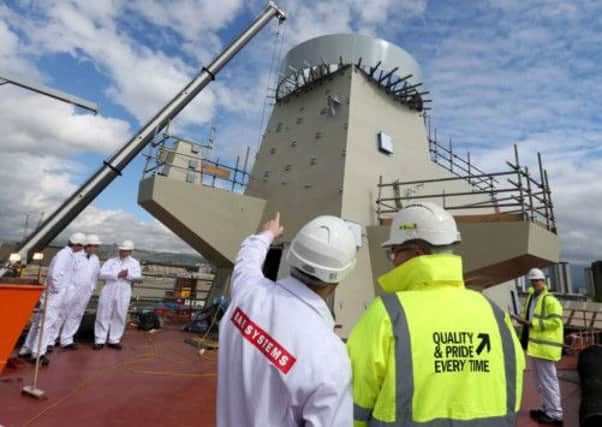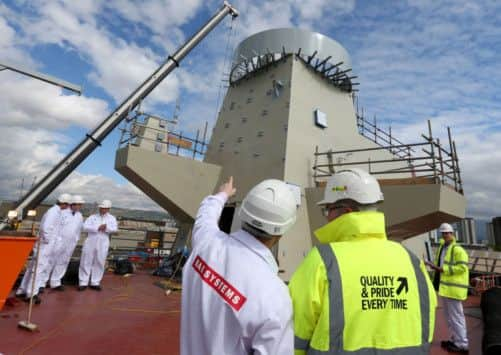BAE Systems job cuts: Political storm over shipyards


Around 800 jobs are to go from two Glasgow yards, but the cuts announced by BAE Systems will see shipbuilding end at Portsmouth after 500 years with the loss of almost 1,000 jobs.
The news was greeted with anger in England, with politicians and workers claiming that the UK government had intervened to maintain shipbuilding on the Clyde to bolster the case for keeping the Union.
Advertisement
Hide AdAdvertisement
Hide AdIt was also claimed the move allowed UK ministers to continue to exert political pressure by holding out the prospect of a massive boost to the Clyde to build 13 new Type-26 frigates – and secure a long-term future – but only if Scotland votes to stay with the Union in next year’s referendum.


On a devastating day for the industry, the defence contractor announced a total of 1,775 shipbuilding jobs are to go across Britain, cutting 940 staff posts at Portsmouth and another 835 jobs in Glasgow, Rosyth in Fife, and Filton, near Bristol.
The job cuts come as work on navy contracts dries up with the construction of the two Queen Elizabeth-class aircraft carriers nearing completion.
The contract for the new frigates will not be given out until the end of the decade. To provide work at the Scotstoun and Govan yards to plug the gap, the government announced yesterday that they would be awarded contracts for three new Royal Navy offshore patrol vessels.
With shipbuilding ending at Portsmouth, that would leave the Scottish yards as the only place in the UK the frigate order could go. But the decision for Portsmouth to bear the brunt of the cuts provoked anger, with Tory MP Caroline Dinenage, whose Gosport constituency is home to many Portsmouth dockyard workers, claiming the south-coast jobs had been “sacrificed” for Scotland.
She said: “The fact Scottish jobs have been protected at the expense of those on the south coast, which is an area of equal economic need, for us is devastating and very upsetting.
“I hope politics isn’t playing a part in it but it’s very difficult to see straight at this time because we are all very affected by the emotion in this.”
Gerald Vernon-Jackson, leader of Portsmouth City Council, said: “The remaining yards with the capability to build advanced warships are in Scotland, and the referendum on Scottish independence is less than one year away. Ministers have put the defence of the UK and the future of the navy at real risk.”
Advertisement
Hide AdAdvertisement
Hide AdThe Independent MP for Portsmouth, Mike Hancock, said: “Alex Salmond was on a no-lose situation. He would benefit if they closed the yard, saying they’re being punished. If they keep the yards open, he’ll say you’re being bribed.”
Workers leaving BAE’s Ports-mouth yard yesterday also slammed the decision to keep more jobs in Scotland while ending a 500-year-old shipbuilding tradition in their city.
One worker said: “I think it is mostly political. Most of the Scottish workers will be quite happy now but everything has been taken away from this yard.”
And another said: “What we can’t understand is we build a better product than Govan. We have been told hands down we are better than them. But most of the managing directors are Scottish so what can you do?”
In the House of Commons, Defence Secretary Philip Hammond yesterday was careful not to give an absolutely firm commitment for the new ships to be built on the Clyde, pointing out they had not been designed yet.
The UK government has said the Type-26 contracts will not be signed until after the 18 September referendum. But later, UK ministers lined up to say if Scotland voted Yes then complex warships such as the Type-26 frigates would not be built outside what remained of the UK.
“This is a matter of law, not politics,” said Alistair Carmichael, the Scottish Secretary.
“The UK can let its contracts of naval ship construction within the UK only because of obvious strategic interests. If at any point Scotland were to remove herself from the rest of the UK then when the rest of the UK came to let its contracts, it would be let within the rest of the UK. That’s law, not politics.” After his Commons appearance, Mr Hammond confirmed the UK Government would be against building warships outside the UK.
Advertisement
Hide AdAdvertisement
Hide AdThe Defence Secretary said: “I see no reason to expect that the UK would want to change from the position that we will build complex warships in the UK for reasons of maintaining sovereign capability in the future.”
The UK Government’s stance infuriated the SNP, who accused London-based ministers of trying to “blackmail” Scottish voters into voting No.
Stewart Maxwell, the West of Scotland MSP, said: “Issuing threats to Scottish workers in order to get them to vote for the same position that they hold is unacceptable and outrageous. People should not be blackmailed into voting No.”
“BAE and the MoD have stated they have chosen the Clyde as the most commercially sensible option (for the Type-26 Frigates) and it has the most skilled workers, and they have taken that position regardless of the constitutional position.”
The SNP deputy leader Nicola Sturgeon said it was a “preposterous suggestion” that people in Scotland should be “punished for voting Yes”.
Labour MP for Glasgow North West, John Robertson, rejected the suggestion Scottish workers were being given preferential treatment but admitted political factors were a concern. He said: “We like to think we’re the best in the world . . . Having said that, there is a fear of course, come a referendum, if Scotland was to go independent, what would happen. So there is still that question mark.”
SEE ALSO: